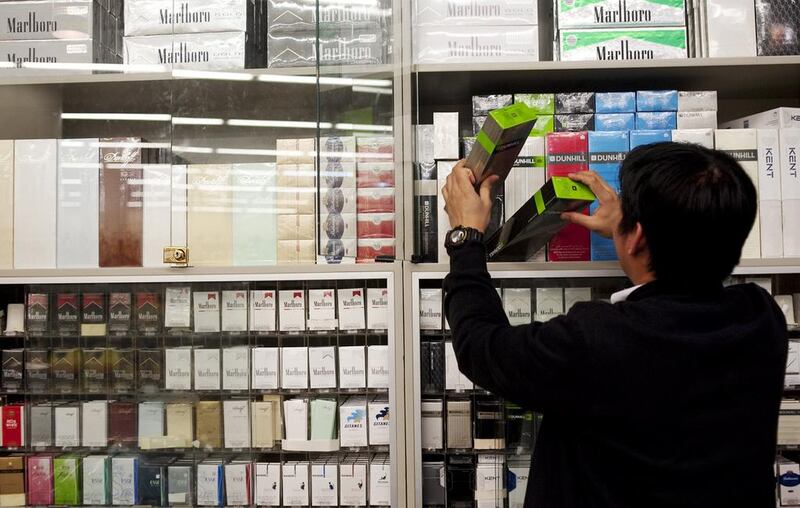GCC health ministers last month endorsed the call for a 100 per cent increase in customs duties on tobacco products.
There are two important issues related to imposing higher taxes on tobacco. The first is the need to avoid sudden, large tax rises that would lead to an increase in illicit trade. The other is that we must not let that illegal trade provide finance to organised crime groups and terrorist organisations.
The vast scale of the illicit trade network is evident in the fact that trade in illicit, and untaxed, tobacco recently became the fourth-largest global tobacco business by volume, just behind British American Tobacco, Philip Morris International and Japan Tobacco International.
According to Euromonitor, illicit trade in cigarettes is the biggest illegal trade in a legal product in terms of value, and second only to illegal drugs in terms of revenue generated by smugglers.
In the Middle East, Iraq, Jordan, Libya and Tunisia were among the top 10 countries for tobacco tax evasion in 2012.
The GCC countries currently have relatively low illicit penetration rates, but are wedged between the tobacco industry’s established smuggling centres in the Middle East/ North Africa/the former Soviet Union, and the burgeoning tobacco markets in the Indian subcontinent.
The GCC countries are surrounded by states with illicit penetration rates in excess of 20 per cent, with countries experiencing war and turmoil – Libya, Syria, Iraq, Somalia, Sudan and Yemen – having illicit penetration rates of 30 per cent and above. With deteriorating security across the region, we can expect growing illicit trade and higher penetration rates.
Tariff and tax-induced price differentials, along with the lack of secure borders within the Middle East, are a major driver of illicit trade. A sudden 100 per cent increase in tobacco taxes across the GCC, as is being currently envisaged, would widen the price gap compared to lower-priced nations such as Iraq, Libya and Yemen and would drive highly lucrative illicit trade across the borders.
There is massive variation in cigarette prices per container – a standard 40-foot container can carry about 10 million cigarettes – across the region. This varies from a low of US$700,000+ in Iran to a high in excess of US$1.5million in Egypt, with the GCC nations ranging towards the higher end of the spectrum.
An increase in ad-valorem taxes (levies made in proportion to estimated value of the goods concerned) would lead to a massive spread in cigarette prices – more than US$1m per container between the lowest and highest — across the region. Such a large price differential is likely to ignite a surge in illicit trade and help finance organised crime and terrorist groups.
International country evidence shows that large tax increases are likely to lead to the emergence or growth of illicit trade and, as a result, typically do not result in achieving the objectives of generating higher revenue and curtailing consumption.
What can the GCC countries do to increase tobacco taxation to raise revenue and address health concerns, while also avoiding encouraging illicit trade in tobacco and the threat of contributing to the financing of terrorism? We propose a multi-pronged approach including legal and regulatory measures in addition to raising taxes and building tax capacity.
1 The GCC countries should become members of the Protocol to Eliminate Illicit Trade in Tobacco Products (ITP).
While the GCC and the majority of Arab countries have signed up to the WHO Framework Convention on Tobacco Control, only a handful of countries – notably Iran, Kuwait, Qatar, Syria, Tunisia, Turkey and Yemen – have signed on to the Protocol to Eliminate Illicit Trade in Tobacco Products.
2 The GCC should develop common standards to comply with the ITP. GCC states should develop and implement a common GCC tracking and tracing solution to ensure the sharing of information.
3 GCC policy harmonisation and coordination to introduce domestic excise taxes. Multilateral and bilateral trade agreements constrain the GCC countries from raising the common external tariff on cigarettes and other tobacco products, thereby restricting the ability of the GCC to raise prices.
The alternative is to introduce a specific nominal domestic excise duty in each GCC member state consisting of a fixed amount per 1,000 cigarettes or equivalent units of OTP.
4 Gradual implementation of excise tax introduction and tax increases. For example, a 100 per cent tax increase could be phased in over a five-year period that would allow the authorities to assess success in implementation of the policy change, while building the necessary effective administration and enforcement.
5 Invest in the build-up of taxation capacity and administration. Implementing new domestic excise taxes and eventually VAT will require tax administration agencies and trained personnel. Effective enforcement requires skilled resources and tools, with officials skilled in audit and investigative techniques, able to use IT tools, implement track-and-trace systems, analyse data sources and the ability to analyse and assess tax declarations.
6 Use modern technologies for tax administration, including the introduction of digital fiscal markers for tobacco and other products based on digital open standards.
7 Develop Public-Private-Partnerships (PPP) and a GCC anti-fraud agency. Leading tobacco manufacturers and the GCC countries could cooperate in the establishment of a GCC anti-fraud agency (similar to the EU's anti-fraud agency (Olaf)) to combat illicit tobacco trade.
Nasser Saidi, president of Nasser Saidi & Associates, was formerly chief economist of the Dubai International Financial Centre, and Lebanon’s minister of economy and trade and minister of industry.
Follow The National's Business section on Twitter






